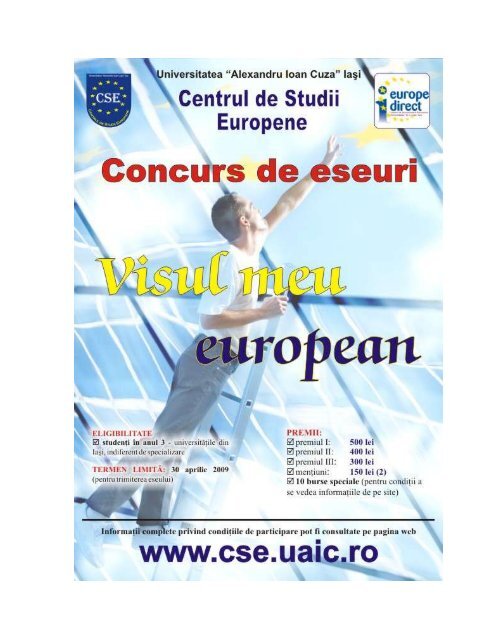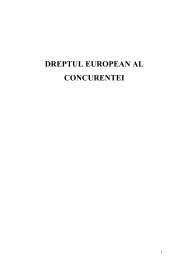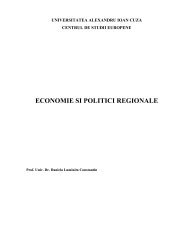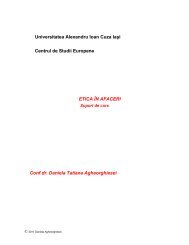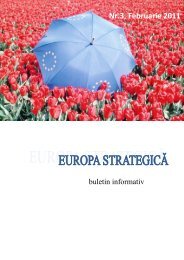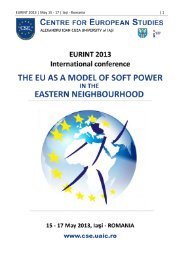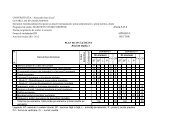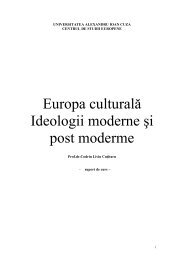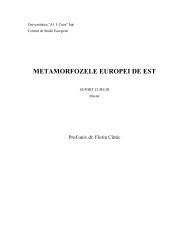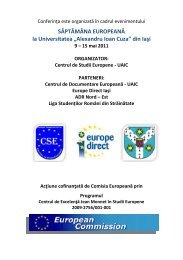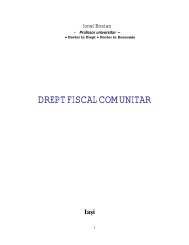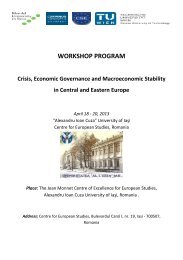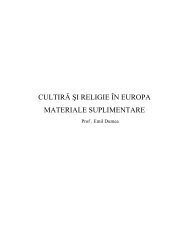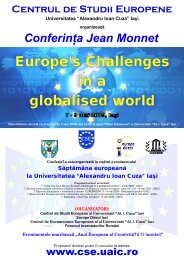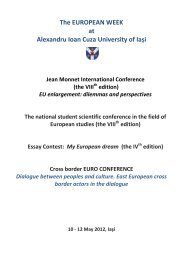Visul meu european - Centrul de Studii Europene - Universitatea ...
Visul meu european - Centrul de Studii Europene - Universitatea ...
Visul meu european - Centrul de Studii Europene - Universitatea ...
- No tags were found...
Create successful ePaper yourself
Turn your PDF publications into a flip-book with our unique Google optimized e-Paper software.
ASAC 2005Toronto, ONTARIODanuta DeregowskaJohn <strong>de</strong> GrosboisVinod KumarEric Sprott School of BusinessCarleton UniversityRISK INTEGRATED FRAMEWORK FOR R&D PORTFOLIO MANAGEMENTNumerous R&D portfolio selection methods have been proposed in the literaturein or<strong>de</strong>r to support R&D managers in their work. However, these methodsusually do not address all of the important challenges at once. The approachproposed in this study integrates several proven portfolio management techniquesin a practical framework which captures and mo<strong>de</strong>ls realistic constraints onproject budget, cash-flow, schedule, and personnel. In addition, it assesses andadjusts for technical, management and commercialization risks and provi<strong>de</strong>s areviewable and accountable <strong>de</strong>cision process.IntroductionR&D portfolio management is a <strong>de</strong>cision process consisting of evaluation and selectionof R&D projects in a company. Its objective is to achieve a balanced portfolio <strong>de</strong>fined as “anassortment of projects that enables a company to achieve the growth and profit objectivesassociated with its corporate strategy without exposing the company to undue risks” (Hills andJones, 1992). The importance of R&D portfolio management is wi<strong>de</strong>ly recognized by bothaca<strong>de</strong>mics and practitioners. Successful R&D portfolio management helps, among others, tomaximize return, to maintain competitive position, to properly and efficiently allocate scarceresources, to forge the link between project selection and business strategy, to achieve focus, toachieve balance, and to better communicate priorities (Cooper et al. 2001). However, R&Dportfolio management is at the same time very difficult: practitioners need to address issues suchas multiple goals and consi<strong>de</strong>rations, rapidly changing environment, multiple <strong>de</strong>cision makersand locations, the need for risk management, limited resources that are often difficult to transferor share between projects, inter<strong>de</strong>pen<strong>de</strong>ncies among projects, uncertain and changinginformation, as well as political processes in firms.In or<strong>de</strong>r to address these challenges and to support practitioners in their R&D portfoliomanagement activities, numerous R&D portfolio selection methods have been proposed in theliterature or <strong>de</strong>veloped in practice. Specific methods inclu<strong>de</strong> among others: financial methods(Carter & Edwards, 2001); business strategy methods such as the strategic buckets approach(Cooper et al., 1997 a, b); bubble diagrams and matrices (Cooper et al., 1998; Mikkola, 2001);scoring mo<strong>de</strong>ls and check lists (DePiante Henriken & Traynor, 1999); balanced scorecard mo<strong>de</strong>ls(Kirchoff et al., 2001); the strategy table approach (Spradlin & Kutoloski, 1999); and operationsresearch mo<strong>de</strong>ls (Graves et al., 2000; Chien, 2002; Oral et al., 1991; Linton et al., 2002, Beattie &Rea<strong>de</strong>r, 1971). A comprehensive summary of R&D project-selection methods can be found inChien (2002), DePiante et. Al (1999), and Linton et al. (2002), while a discussion of bestpractices is presented in Griffin (1997), and Cooper et al. (1997a,b; 1998; and 2001).Despite the large number of different methodologies proposed in the literature, as well asthose practiced in business, practitioners still face many problems during portfolio management:the portfolio of fun<strong>de</strong>d projects does not reflect the business strategy; the quality of R&D59
<strong>Centrul</strong> <strong>de</strong> <strong>Studii</strong> <strong>Europene</strong> şi <strong>Centrul</strong> <strong>de</strong> Documentare Europeanădin cadrul Universităţii “Al. I. Cuza” IaşiorganizeazăConcurs <strong>de</strong> eseuri<strong>Visul</strong> <strong>meu</strong> <strong>european</strong>„without dreaming…we shall never build a better Europe”Vaclav HavelCu scopul <strong>de</strong> a promova interesul stu<strong>de</strong>nţilor pentru domeniul studiiloreuropene şi <strong>de</strong> a încuraja <strong>de</strong>zbaterile legate <strong>de</strong> Uniunea Europeană, <strong>Centrul</strong> <strong>de</strong><strong>Studii</strong> <strong>Europene</strong> şi <strong>Centrul</strong> <strong>de</strong> Documentare Europeană din cadrul Universităţii„Alexandru Ioan Cuza” Iaşi organizează concursul <strong>de</strong> eseuri „<strong>Visul</strong> <strong>meu</strong> <strong>european</strong>”.Tema concursului este <strong>de</strong>osebit <strong>de</strong> generoasă, oferind participanţilor o paletălargă <strong>de</strong> subiecte care pot fi abordate şi valorificate cu ajutorul cunoştinţelor şiimaginaţiei lor. Prin intermediul eseului cei interesaţi au posibilitatea să expună, să<strong>de</strong>talieze şi să argumenteze viziunea proprie referitoare la procesul <strong>de</strong> integrare<strong>european</strong>ă şi să propună un proiect imaginar al Europei <strong>de</strong> mâine.Cre<strong>de</strong>m că prin acest concurs <strong>de</strong> eseuri pot fi valorizate i<strong>de</strong>ile noii generaţii<strong>de</strong>spre subiecte <strong>de</strong> maxim interes pentru construcţia <strong>european</strong>ă, precum:- modul în care este percepută Uniunea Europeană <strong>de</strong> către noua generaţie;- ce fel <strong>de</strong> Europă îşi doresc tinerii şi care sunt oportunităţile, respectivconstrângerile oferite <strong>de</strong> spaţiul <strong>european</strong> <strong>de</strong> astăzi;- ce fel <strong>de</strong> provocări apar în contextul noilor realităţi economice şi sociale dinUE;- în ce mod se regăsesc tinerii în mo<strong>de</strong>lul <strong>european</strong> actual <strong>de</strong> integrare;- cum ar arăta o „Europă i<strong>de</strong>ală” pentru tinerii români.Fiind <strong>de</strong>schişi i<strong>de</strong>ilor dumneavoastră, eseul fiind în esenţă un <strong>de</strong>mers creativ,vă propunem următoarele sintagme-cheie:Statele Unite ale Europei;Mo<strong>de</strong>lul social <strong>european</strong>;Cetăţenie <strong>european</strong>ă;Drepturi şi libertăţi fundamentale;Diversitate culturală;
Solidaritate;Fe<strong>de</strong>raţie;Confe<strong>de</strong>raţie.Speranţa noastră este că această competiţie va asigura un context favorabilpentru conturarea <strong>de</strong> opinii originale şi provocatoare privind construcţia <strong>european</strong>ă şi,<strong>de</strong> ce nu, <strong>de</strong>finirea unor proiecţii pentru Europa <strong>de</strong> mâine.Eseurile vor face subiectul unei <strong>de</strong>zbateri organizate cu ocazia zilei Europei (încadrul evenimentului SĂPTĂMÂNA EUROPEANĂ la <strong>Universitatea</strong> „Alexandru IoanCuza”, 7-9 mai 2009). Cele mai bune eseuri vor fi promovate prin site-ul <strong>Centrul</strong>ui <strong>de</strong><strong>Studii</strong> <strong>Europene</strong> şi prin publicare in Buletinul electronic al Europe Direct Iaşi.Eligibilitate:Concursul se adresează stu<strong>de</strong>nţilor din anul III din centrul universitar Iaşi,indiferent <strong>de</strong> universitate şi <strong>de</strong> specialitatea urmată;Se acceptă doar lucrări originale, care nu au mai participat la alte competiţii,concursuri, conferinţe (se va solicita <strong>de</strong>claraţia pe propria răspun<strong>de</strong>re);Se vor lua în consi<strong>de</strong>rare doar lucrările <strong>de</strong> unic autor, fiecare participant putândconcura cu un singur eseu.Condiţii <strong>de</strong> redactare:Lucrarea trebuie să aibă maxim 6 pagini, inclusiv bibliografia;Eseurile vor fi redactate în limba română;Structura eseului: argument şi concept general (5-10 rânduri), conţinutuleseului, referinţe bibliografice (maxim 4 surse);Textul eseului va fi redactat utilizând Font Times New Roman, Size 12, la unrând şi jumătate, utilizând opţiunea “Justify”;Eseul va inclu<strong>de</strong> titlul, dar nu şi numele autorului (în locul numelui se va treceun acronim al eseului din maxim 6 caractere, acronim care se va regăsi înformularul <strong>de</strong> înscriere);Pentru trimitere, documentul va fi convertit în format pdf. cu <strong>de</strong>numirea „eseu_2009_nume_prenume.pdf”Criterii <strong>de</strong> evaluare:Condiţii <strong>de</strong> formă (respectarea condiţiilor <strong>de</strong> tehnoredactare, aspect general)2 p.Înţelegerea principiilor fundamentale ale UE (organizare, mo<strong>de</strong>l <strong>european</strong>,perspective) 5 p.Calitatea argumentelor şi gradul <strong>de</strong> originalitate 10 p.Calitatea generală a exprimării 3 p.
PremiiPremiul I: 500 leiPremiul II: 400 leiPremiul III : 300 leiMenţiune: 150 lei (2 premii)10 burse speciale, acordate în ordinea <strong>de</strong>screscătoare a punctajului general,pentru participanţii la concurs care vor <strong>de</strong>veni stu<strong>de</strong>nţi ai Masterului în <strong>Studii</strong><strong>Europene</strong> (echivalentul a 15% din taxa <strong>de</strong> studiu aferentă anului universitar2009/2010)Termene limită:30 aprilie 2009: eseul şi formularul <strong>de</strong> înscriere vor fi trimise la adresainfocse@uaic.ro cu menţiunea “partcipare la concursul <strong>de</strong> eseuri ….”5 mai 2009: anunţarea finaliştilor8 mai 2009: <strong>de</strong>zbatere: „<strong>Visul</strong> <strong>meu</strong> <strong>european</strong>”, organizată în cadrul conferinţeiJean Monnet, intitulată Europe challanges in a globalised world.8 mai 2009: festivitatea <strong>de</strong> premiere (în cadrul lucrărilor <strong>de</strong> închi<strong>de</strong>re aleconferinţei).Comisie:Comisia <strong>de</strong> specialitate (constituită la nivel naţional) este formată din specialişti îndomeniul studiilor europene.Secretariatul comisiei:Ciprian AlupuluiRamona FrunzăE-mail: infocse@uaic.ro


